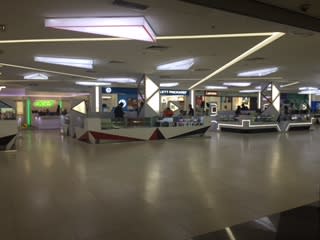MARA Digital Mall: Segregated Shopping
By Lyana Khairuddin
There is no denying that shopping is a national past time for most Malaysians. After all, we do have more shopping malls than recreational parks.
While most malls believe in diversity of business to cater to more customers, some malls prefer to be specialised, selling only electronics, clothes or out-of-season products.
While such specialisation can be considered a business strategy, some are wont to combine this with ethnicity and/or religion, to cater for a particular market. This can be seen in the proposed law to have separate, colour-coded shopping trolleys for halal and non-halal items, premium halal mineral water and the new Rayani Air marketing itself as a “syariah-compliant” airline.
What’s next for Malaysia? A syariah-compliant shopping mall?
Such segregated shopping options is an addition to the series of social segregation already happening around the country through schools, universities, and even housing areas.
It saddens me that such segregation is happening in the supposedly moderate, multi-cultural melting pot I call my home. Calls for unity and inter-ethnic mingling seem hollow, with nearly every issue being turned into an issue of race.
The building blocks towards the above have long been set. Following the Low Yat Plaza incident where a mobile phone sale turned into a racial brawl, Malaysia’s Minister for Rural and Regional Development proposed a plan for a digital mall operated solely by Malay proprietors.
Barely three months following this proposal, the MARA Digital Mall was born.
Or rather, one floor of Medan Mara on Jalan Tunku Abdul Rahman in Kuala Lumpur is now dedicated solely to selling digital gadgets.
It has been reported that the Minister has called for Malaysians from all ethnic background and walks of life to shop there and support the success of the mall, despite its solely Malay proprietors’ policy and link to the Low Yat Plaza incident that led to its opening.
A week later, he announced that the business model would be replicated nationwide while dismissing criticism and citing it is too early to deem the business model a failure.
The proprietors at MARA Digital enjoy six months free rental, a move to assist their footing in an industry that has long been touted to be dominated by non-Malays.
However, walking into Medan Mara, and up to the third floor where the digital “mall” is – I could not help but feel a bit underwhelmed.
There are huge banners publicising the “mall” on the façade of the building, with buntings of said Minister having officiated the “mall” placed strategically at escalators. The particular floor is better lit than other floors in the building, and looks newly refurbished.

There are not many shops on that floor and there is a lack of vibrancy compared to another digital mall that I frequent in Section 14, Petaling Jaya. The place looks bare; there were not many shoppers. A few retailers have yet to open their doors, and many salespeople are more interested in their smartphones than attracting customers. The usual popular brands of laptops are there, but nothing you wouldn’t find in other malls.
I also cannot dismiss the lack of Christmas decorations and carols that is usually found at shopping areas at this time of the year. Maybe I have not stepped foot in Medan Mara in a long time, but I do not remember ever hearing nasyid being played as a soundtrack to shopping before.
Perhaps it is a tad too early to measure the success of MARA Digital Mall. I am neither an economist nor am I business-minded, but as a customer, I know what I look for when I go shopping.
I want variety of items on display; I want to be able to compare prices between shops of similar nature in one mall. I would look towards affordable and ease of parking or accessibility via public transport.
For IT products, I would also look to knowledgeable salespeople, being not technologically savvy myself. I would look for availability and efficiency of post-sale service, and warranty options. I also won’t say no to offers and gifts-with-purchase!
For MARA Digital Mall, I personally think that it has a very long way to go to court the customers it desires in order to ensure success and sustainability. It has to be more competitive, more sales-aggressive and think of business strategies that would attract and court customers.
Nothing on my list above points to proprietors’ race or religion – a sentiment I hope many others share with me.
It would be great if loans or rent-waivers are given to new and emerging entrepreneurs to “find their footing” regardless of ethnicity. Customers and proprietors should both know their rights, and know that their business would improve if there were a good sales and service rapport.
Above all, we should move beyond being racist, and instead collectively demand for better service and products from our salespeople.
Lyana Khairuddin is a scientist who works in the field of HIV & HPV, and remains a naïve optimist in Malaysia.

